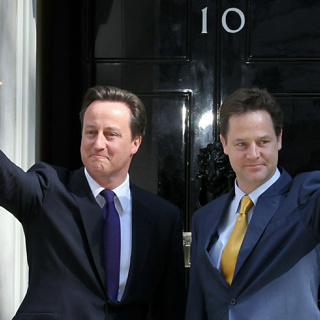
20. Interlude
The First Civil War had ended. King Charles I had lost, which wasn't just a military or political problem, but a religious one too: after all, if God had made him king, and God also determined who won wars, who could make sense of what was going on? Had God sided with Parliament against the king he'd set on his throne in the first place. In practical terms, Charles was in captivity, a prisoner of Parliament. In the country at large, normal politics could have restarted, if politics had been anything like normal. There were tensions between Parliament and Parliament's army, which was beginning to do some of its own political soul-searching. Which was particularly interesting, since it was the most powerful organisation in the country. And, within the army itself, there were tensions too, as new trends appeared, among common people, wondering whether, what will all the fighting they were doing, and all the sacrifices they had made, they shouldn't be given a bit more of a say in the running of the state. Fascinating debates. Sadly cut short. Because Charles may have been down, but he wasn't yet out. And he could still do something destructive and self-destructive. The illustration is the front page of one of the versions of the Leveller document, 'An Agreement of the People', laying out demands for wider political rights. Music: Bach Partita #2c by J Bu licensed under an Attribution-NonCommercial-No Derivatives (aka Music Sharing) 3.0 International License
22 Feb 202114min

19. First Civil War: Parliament gets serious
Parliament getting serious about the Civil War, getting its act together on military matters - above all by launching its New Model Army - and starting to win some key battles. Against that context, and helping Parliament on its way to success, there's the meteoric rise of Oliver Cromwell, a man whose military ability hadn't been suspected before. Not that this will be the end of his surprises for England. The episode ends as the First Civil War - ironically referred to as the 'Great Civil War' - also closes with poor old King Charles I in pretty dire straits. General Oliver Cromwell at Marston Moor, 1644 Engraving by William French after Ernest Crofts ARA, published by J S Virtue and Company Limited, London, 1860 (c). National Army Museum. 1999-04-158-1 Music: Bach Partita #2c by J Bu licensed under an Attribution-NonCommercial-No Derivatives (aka Music Sharing) 3.0 International License
17 Feb 20219min

18. First Civil War: the fight gets going
Oh dear, oh dear. Charles I pushed and pushed. Eventually, the other side pushed back. First it was the Scots, who turned out to be a lot better at fighting than Charles had imagined, and gave him a considerable black eye. Then, when he turned to Parliament in London, after eleven years without calling one, far from getting the funds he needed to fight the Scots, he found himself at loggerheads with them too. And then things turned even nastier... The illustration is courtesy of the National Army Museum, and shows 'roundhead' cavalrymen in Moorland. Music: Bach Partita #2c by J Bu licensed under an Attribution-NonCommercial-No Derivatives (aka Music Sharing) 3.0 International License
12 Feb 202113min

17. Things fall apart
Charles I, like his father, proved extremely good at not being at all good at getting on with people he really needed to be really good at getting on side. Just like with his Dad, that mainly meant Parliamentarians. People like John Hampden, one of the great warriors against royal overreach, and a certain Oliver Cromwell who - and I don't think this is a spoiler - would have a pretty big role to play later. There was one big difference between father and son, though: James managed to avoid things getting so bad that they degenerated into actual warfare. Welcome to the threshold of the English Civil Wars. King Charles I, by Gerrit van Honthorst, oil on canvas, 1628 National Portrait Gallery, London, 4444 http://creativecommons.org/licenses/by-nc-nd/3.0/ Music: Bach Partita #2c by J Bu licensed under an Attribution-NonCommercial-No Derivatives (aka Music Sharing) 3.0 International License
7 Feb 202110min

16. Slippery Slope
Charles I started his reign in just the way he'd go on with it, and in just the way his father James I/VI had ended his: by getting right up the noses of most of his subjects in Scotland as well as England, and falling apart big time with the Westminster Parliament. Having failed with one attempt at a marriage with a Catholic Princess from Spain, he just organised himself a different one, with a Catholic Princess from France - Spain's deadliest enemy but just as Papist. He got into disputes with Parliament and Protestants generally about anti-Protestant, or even pro-Catholic action, and with Parliament specifically about taxation, since he could never raise enough for his needs without their authorisation, which he resented. In this neat way, he set up all the pieces for the painful clashes he'd face over the following years. The illustration is a portrait of King Charles I, by Gerrit van Honthorst, oil on canvas, 1628 National Portrait Gallery, London, 4444 The music is Bach Partita #2c by J Bu. Both image and music are licensed under an Attribution-NonCommercial-No Derivatives (aka Music Sharing) 3.0 International License http://creativecommons.org/licenses/by-nc-nd/3.0/
2 Feb 20218min

15. Bad to Worse
The end of James Stuart's reign over Scotland and England was no more impressive than the earlier part. One of the wonderful, crazy and ultimately futile episodes was the 'Spanish Match', involving the future Charles I and his father's favourite, the future Duke of Buckingham, travelling to Madrid to try and grab a bride for Charles. An attempt which involved a bit of stalking, understandably rejected by the lady involved. And it was a total failure, unsurprisingly. And yet... Charles was greeted by cheering crowds on his return to England. Illustration: Maria Anna of Spain, by Diego Velázquez Music: Bach Partita #2c by J Bu licensed under an Attribution-NonCommercial-No Derivatives (aka Music Sharing) 3.0 International License
28 Jan 20218min

14. Reckless Romanticism, a Touch of Gayness, and Bonfires
The marriage of James VI of Scotland, later James I of England, to Anne of Denmark started off with some romanticism, including a dangerous sea crossing to fetch her home, and it certainly produced a lot of pregnancies (very much a royal couple's duty), though things then rather faded. That's possibly because James wasn't quite as interested in women as the initial gesture suggested. But there was no way he could be openly gay at that time. There were also quite a few conspiracies against him, most famously the 'Gunpowder Plot' in which Guy Fawkes played a major role. That left Britain with its annual bonfire nights, including the burning of the unfortunate Guy in effigy. Not perhaps the most charming of traditions. Illustration: George Villiers, Duke of Buckingham, favourite of James I of England Portrait by Michiel J. van Miereveld Music: Bach Partita #2c by J Bu licensed under an Attribution-NonCommercial-No Derivatives (aka Music Sharing) 3.0 International License http://creativecommons.org/licenses/by-nc-nd/3.0/
23 Jan 20219min

13. Wise Fool
James I of England (VI of Scotland) had clear ideas of what kingship meant. It meant he'd been chosen by God to run the show and Parliament wasn't going to get in his way. The trouble was, Parliament controlled the money. And James's attitude wasn't going to make any friends there. A fine scholar, he proved himself pretty useless as a politician. No wonder they called him "the wisest fool in Christendom". Illustration: Title page of a King James Bible, lasting legacy of the first Stuart King ©Maharage Don Janaka Dharmasena/123RF.COM Music: Bach Partita #2c by J Bu licensed under an Attribution-NonCommercial-NoDerivatives (aka Music Sharing) 3.0 International License
18 Jan 20219min





















